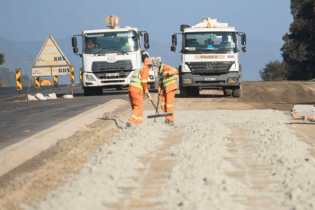Nazir Alli might be out of the picture, but Sanral’s plans to roll out e-tolling endure. This week the government task team headed by Deputy President Kgalema Motlanthe will begin trying to work out what to do about the court interdict barring the controversial tolling on Gauteng’s highways.
Motlanthe will lead a committee, made up of a swathe of Cabinet ministers from, among others, the departments of transport, finance and public enterprise, which will “assess” the North Gauteng High Court’s ruling and “ensure” the financial stability of the South African National Roads Agency Limited (Sanral) – the body responsible for the system’s implementation, which is effectively doomed unless tolling goes ahead within the next six months. “I am confident the committee will in due course respond to all the issues being raised around the future of e-tolling,” government spokesperson Jimmy Manyi told the Mail & Guardian. But despite government’s confidence Motlanthe and his team face a stiff challenge in providing a constructive solution to a problem that has become a political liability. Although the department of transport had previously decided to delay implementation until the end of May, after discussions between the ANC and Cosatu, the North Gauteng high court ruled the project cannot go online without a full hearing into its viability and impact on South African citizens. Out of optionsAs such the government is faced with few possibilities in charting a way forward without the system remaining offline for the foreseeable future. The government had previously warned that delaying would have dire effects on their spending in other social programmes in the education and health sectors, and the department of finance said last week that Sanral is unlikely to last much longer than six months. Adding further insult to the agency’s injury, Sanral could eventually be forced to pay back about R25-million to consumers who have already fitted e-tags to their vehicles and signed up for the system. Depending on what Motlanthe’s task team decides, the government may elect to challenge the interdict and fight the case in court, hoping the scales of justice will tip in their favour. However, if they choose to embark on a legal challenge, the government will most certainly be met with massive civil opposition, led by the Opposition to Urban Tolling Alliance (Outa). Outa time
As the main applicants behind the legal challenge to e-tolling, Outa has warned it will meet the government head on if it takes its case to the courts. “We never wanted to go this far.
It was only when government made it clear they had not thought [e-tolling] through properly, not consulted with the public enough, and were determined to push e-tolling through, that we were prepared to go to court,” Outa chairperson Wayne Duvenage told the M&G in a one-on-one interview last week.
Having already racked up a legal bill of R3.5-million in obtaining the interdict, Duvenage said Outa is receiving massive financial support from business and the general public. “We have hundreds of people asking how they can help us take up this challenge. They want to contribute because they feel it is their case and feel like they are part of the reason e-tolling was stopped,” he said. Accordingly, Outa has set up infrastructure to aid fund-raising for their legal challenge, including an SMS line and a non-profit bank account. Out of friendsBesides opposition from business and civil society, the ANC government also faces an internal revolt from within the tripartite alliance. Cosatu, South Africa’s largest labour federation, has openly voiced its opposition towards e-tolling, hosting a mass rally in March that saw thousands take to the streets across the country to protest against the system. One might imagine government facing up to Outa in court, but it is less certain that they would face off against their political partners. But if government decides to backtrack on its decision to implement e-tolling, that will come with its own challenges. Ratings agency Moody’s downgraded Sanral’s financial rating recently as a result of the wrangle over who will pay for e-tolling. Out of economic favour
If the issue is not resolved, further deterioration of Sanral’s financial standing could result in an overall downgrade of the government bond rating, which would be a grievous blow for the general South African economy. It is with this in mind that Motlanthe’s committee will need to navigate its way to a solution, something that could only come in the way of considered negotiation. “At the end of the day, the road infrastructure was built and needs to be paid for. It is just deciding who will pay that is the question. Government needs to bring all stakeholders to the table and find a solution,” Professor Steven Friedman, director of the Centre of the Study for Democracy told the M&G.








